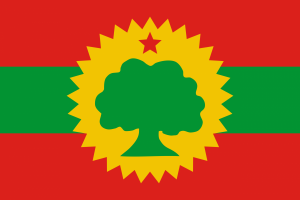Language/Borana-arsi-guji-oromo/Grammar/Personal-Pronouns
| ◀️ Singular and Plural Nouns — Previous Lesson | Next Lesson — Numbers 1-20 ▶️ |
Introduction[edit | edit source]
Welcome to the lesson on personal pronouns in the Borana-Arsi-Guji Oromo language! Personal pronouns are an essential part of any language, as they allow us to refer to ourselves and others in conversation. In this lesson, we will explore the different forms and uses of personal pronouns in Borana-Arsi-Guji Oromo. As a complete beginner, this lesson will help you develop a solid foundation in understanding and using personal pronouns correctly.
Subject Pronouns[edit | edit source]
Subject pronouns are used to indicate the subject of a sentence or clause. They replace the noun that is performing the action. In Borana-Arsi-Guji Oromo, subject pronouns are used in a similar way to English. Here are the subject pronouns in Borana-Arsi-Guji Oromo:
| Borana-Arsi-Guji Oromo | Pronunciation | English |
|---|---|---|
| Ani | /a-ni/ | I |
| Ati | /a-ti/ | You (singular) |
| Iyye | /i-ye/ | He |
| Iyyeessa | /i-ye-sa/ | She |
| Iyyeetti | /i-ye-ɛ-ti/ | It |
| Nuti | /nu-ti/ | We |
| Huti | /hu-ti/ | You (plural) |
| Iyyeettiin | /i-ye-ɛ-ti-in/ | They |
Let's see these pronouns in action with some examples:
- Ani dhaaba. (I am eating.)
- Ati badaa? (Are you coming?)
- Iyye wal qabatee? (Is he coming?)
- Iyyeessa wal qabatee? (Is she coming?)
- Iyyeetti kaan wal qabatee? (Is it coming?)
- Nuti wal qabna. (We are coming.)
- Huti wal qabna. (You all are coming.)
- Iyyeettiin wal qabna. (They are coming.)
Object Pronouns[edit | edit source]
Object pronouns are used to indicate the object of a verb or preposition. They replace the noun that is receiving the action. In Borana-Arsi-Guji Oromo, object pronouns are similar to subject pronouns, with a few exceptions. Here are the object pronouns in Borana-Arsi-Guji Oromo:
| Borana-Arsi-Guji Oromo | Pronunciation | English |
|---|---|---|
| Ani | /a-ni/ | Me |
| Ati | /a-ti/ | You (singular) |
| Iyye | /i-ye/ | Him |
| Iyyeessa | /i-ye-sa/ | Her |
| Iyyeetti | /i-ye-ɛ-ti/ | It |
| Nuti | /nu-ti/ | Us |
| Huti | /hu-ti/ | You (plural) |
| Iyyeettiin | /i-ye-ɛ-ti-in/ | Them |
Let's see these pronouns in action with some examples:
- Ani dhabe. (He sees me.)
- Ati dhabe? (Does he see you?)
- Iyye dhabe. (He sees him.)
- Iyyeessa dhabe. (He sees her.)
- Iyyeetti dhabe. (He sees it.)
- Nuti dhabe. (He sees us.)
- Huti dhabe. (He sees you all.)
- Iyyeettiin dhabe. (He sees them.)
Possessive Pronouns[edit | edit source]
Possessive pronouns are used to indicate ownership or possession. They replace the noun that is being possessed. In Borana-Arsi-Guji Oromo, possessive pronouns are formed by adding a suffix to the object pronouns. Here are the possessive pronouns in Borana-Arsi-Guji Oromo:
| Borana-Arsi-Guji Oromo | Pronunciation | English |
|---|---|---|
| Anin nyaachis | /a-nin ɲaː-tʃis/ | My |
| Atin nyaachis | /a-tin ɲaː-tʃis/ | Your (singular) |
| Iyyeen nyaachis | /i-jeːn ɲaː-tʃis/ | His |
| Iyyeessan nyaachis | /i-jeː-san ɲaː-tʃis/ | Her |
| Iyyeettin nyaachis | /i-jeː-tin ɲaː-tʃis/ | Its |
| Nutin nyaachis | /nu-tin ɲaː-tʃis/ | Our |
| Hutin nyaachis | /hu-tin ɲaː-tʃis/ | Your (plural) |
| Iyyeettiin nyaachis | /i-jeː-tin ɲaː-tʃis/ | Their |
Let's see these pronouns in action with some examples:
- Anin nyaachis kitaaba. (This is my book.)
- Atin nyaachis kitaaba? (Is this your book?)
- Iyyeen nyaachis kitaaba. (This is his book.)
- Iyyeessan nyaachis kitaaba. (This is her book.)
- Iyyeettin nyaachis kitaaba. (This is its book.)
- Nutin nyaachis kitaaba. (This is our book.)
- Hutin nyaachis kitaaba. (This is your book.)
- Iyyeettiin nyaachis kitaaba. (This is their book.)
Cultural Insights[edit | edit source]
In the Borana-Arsi-Guji Oromo culture, personal pronouns play an essential role in communication. They reflect the respect and hierarchy within the community. For example, the use of "Ati" (you singular) shows a level of familiarity and closeness, while "Huti" (you plural) indicates a more formal setting or a larger group.
Furthermore, Borana-Arsi-Guji Oromo pronouns also reflect gender distinctions in some cases. For instance, "Iyye" is used to refer to males, while "Iyyeessa" is used for females. This distinction is culturally significant and reflects the gender roles and dynamics within the community.
Practice Exercises[edit | edit source]
Now it's time to practice what you've learned! Complete the following exercises using the correct personal pronouns in Borana-Arsi-Guji Oromo:
Exercise 1: Translate the following sentences into Borana-Arsi-Guji Oromo: 1. She is my friend. 2. We love our family. 3. Are they coming to the party? 4. He sees you. 5. This is their house.
Exercise 2: Translate the following sentences from Borana-Arsi-Guji Oromo to English: 1. Iyyeettiin nyaachis kitaaba. 2. Nuti dhabe. 3. Ani dhaaba. 4. Huti wal qabna. 5. Iyyeessa wal qabatee?
Exercise 1 Solution: 1. Iyyeessa jedhee nama dhufan. 2. Nuti qoqqoban dinqu. 3. Iyyeettiin baay'een dhiiftan? 4. Iyye ati dhabe. 5. Iyyeettiin qabatan dhera.
Exercise 2 Solution: 1. They see the book. 2. We are coming. 3. I am eating. 4. You all are coming. 5. Is she coming?
Great job on completing the exercises! Practice regularly to reinforce your understanding and usage of personal pronouns in Borana-Arsi-Guji Oromo.
Other Lessons[edit | edit source]
- Alphabet and Pronunciation
- Negation
- Give your Opinion
- Past Tense
- How to Use Have
- 0 to A1 Course
- Adjectives
- Future Tense
- Plurals
Template:Borana-arsi-guji-oromo-Page-Bottom
| ◀️ Singular and Plural Nouns — Previous Lesson | Next Lesson — Numbers 1-20 ▶️ |

